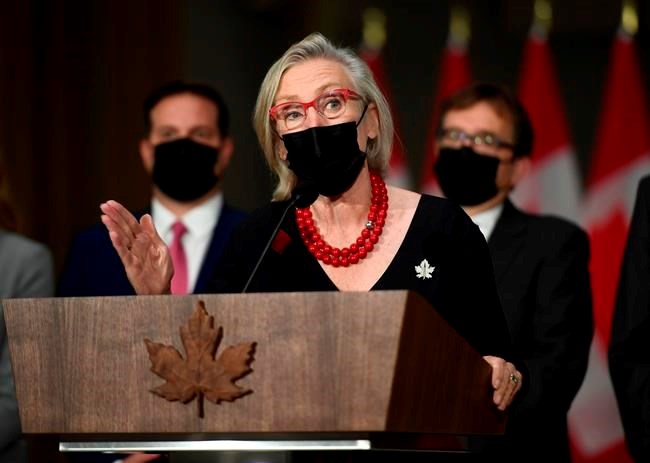OTTAWA — Canada's new minister of mental health and addictions says she is very interested in proposals from British Columbia on how to proceed with a plan for addressing the opioid crisis.
Asked about specifically when action will be taken, Carolyn Bennett did not respond directly,but said her meetings on Thursday with the B.C. Centre on Substance Use and on Friday with her B.C. counterpart, Sheila Malcolmson, would be key to finding an approach toward providing a safe supply of the drug alongside decriminalizing possession.
She said the federal government has an obligation to listen to those on the front lines of the crisis and respond appropriately.
"We don't want to do anything that makes things worse, that recriminalizes people," said Bennett in an interview Thursday.
B.C. has sought to decriminalize possession of small amounts of illicit drugs, but needs approval from Health Canada to do so.
Malcolmson said in a statement that decriminalization will reduce the fear and shame associated with drug use that keeps people from treatment and support. She also said B.C. is expanding access to prescribed safer supply.
Bennett said that after the meetings she planned to see how quickly the government can begin the work that is required on decriminalization and safe supply.
The Trudeau government has rejected wholesale decriminalization of simple drug possession while rolling out some pilot projects to provide safer pharmaceutical alternatives to toxic street drugs.
Leslie McBain, founder of advocacy group Moms Stop The Harm, who also met with Bennett on Thursday, said she and the minister spoke about decriminalization, adding that Bennett seemed interested. McBain cautioned that decriminalization wouldn’t in and of itself end the epidemic.
"It's going to end stigma. It's going to end the fear of people who have to go out and buy the drugs on the streets. It will do a lot of really good things, and it is essential,"McBain said Friday.
The opioid crisis has worsened during the pandemic, with fatal overdoses and emergency room visits having increased in different parts of the country. Leigh Chapman, a registered nurse and organizer with the Toronto Overdose Prevention Society, said the opioid crisis has in some ways been eclipsed by the pandemic.
Chapman said she was pleased Bennett seemed interested in decriminalizing possession of drugs for personal use because individuals are marginalized for trying to survive in the way they know how. She also said Bennet should talk to drug users who are directly harmed by criminalization.
"We need to really think about how we're treating people who use drugs and look at an alternative because the current model of criminalization is not working. It hasn't worked for over 100 years," Chapman said Friday.
Chapman and McBain wondered whether the new federal ministry could create a safe supply of opioids to prevent fatal overdoses or decriminalize possession because both issues overlap with other ministries.
"Whether this new ministry will be nimble enough to do that work, they will need funding to be able to leverage it for sure,” Chapman said.
Asked about how she will address the opioid crisis as it affects Indigenous communities, Bennett said anything the federal government does need to be culturally safe and competent, as well as trauma-informed.
Bennett, who previously held the position of Crown-Indigenous relations minister, said she will "listen and learn from the people who have been leading this work in Indigenous communities for a very long time," adding that work would be done jointly with experts and those with lived experience.
This report by The 91Ô´´ Press was first published Nov. 19, 2021.
—â¶Ä”â¶Ä”
This story was produced with the financial assistance of the Facebook and 91Ô´´ Press News Fellowship.
Erika Ibrahim, The 91Ô´´ Press



